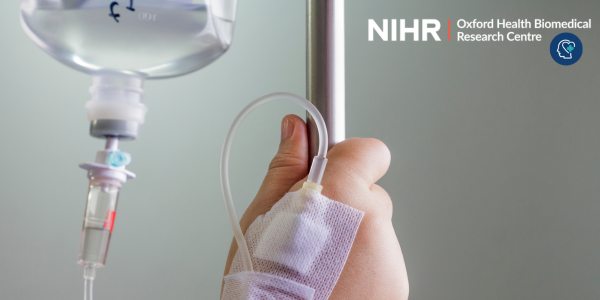
As we mark 25 years since the first clinical trial demonstrating ketamine’s antidepressant effects in people with major depressive disorder, researchers from Oxford Health Biomedical Research Centre (OH BRC) have published new research into ketamine as a treatment for depression.
Depression Therapeutics Theme researchers recently published this review paper into effects of the drug on depression, “The cognitive neuroscience of ketamine in major depression”, in the journal Brain.
Ketamine, originally developed in the 1960s as an anaesthetic, has emerged as a promising treatment for depression, particularly for individuals who do not respond to conventional antidepressants.
Unlike traditional medications, a single dose can ease depressive symptoms within hours, including anhedonia (loss of pleasure) and the effects can last for days. The study looked at how ketamine works at a molecular level, however its impact on thinking and emotional processes is still being explored.
Early trials involved groups of patients receiving low doses of ketamine intravenously. These studies revealed significant improvements in mood within hours, with effects lasting for up to 72 hours.
Ketamine works by blocking a specific brain receptor, which affects how brain circuits process emotions and rewards. It appears to reduce activity in an area of the brain linked to negative emotion and enhance connectivity in reward-related areas of the brain. These changes may help reverse the negative thinking patterns common in depression.
Ketamine may also influence how people recall emotional memories, with studies indicating the drug may help reframe self-perception when paired with psychological training.
Despite its promise, ketamine’s use is limited by side effects and concerns about long-term safety. It is classified as a controlled substance in the UK and has potential for misuse. However, its success has led to the development of esketamine (Spravato), a nasal spray approved by regulators in the UK, EU and US.
Researchers continue to explore ketamine’s role in building resilience to stress and preventing conditions like postnatal depression. While questions remain, ketamine has opened the door to a new generation of fast-acting antidepressants, offering hope to those living with treatment-resistant depression.
Warning: Risks of ketamine misuse
Ketamine is a dissociative anaesthetic with well-established medical applications. However, when used outside of supervised medical settings, it can be extremely dangerous and lead to serious physical and psychological harm.
For more information on the work of OH BRC contact: ohbrcenquiries@oxfordhealth.nhs.uk


